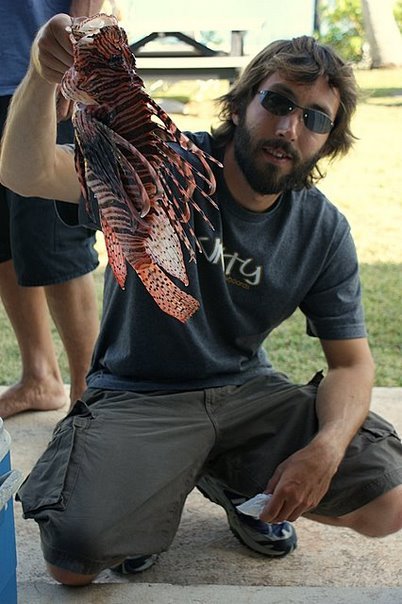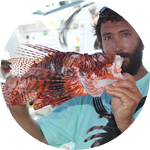About This Project
A team of scientists from Bermuda is gathering data to model the ecological impact lionfish may have on their coral reefs and to develop a targeted removal plan that controls the growth of this population to minimize its damage. This project will focus on the growth and feeding habits of lionfish to complete that model and explore the relationship between lionfish, their prey, and the entire ecosystem.Ask the Scientists
Join The DiscussionWhat is the context of this research?
The lionfish population in Bermuda is growing
rapidly, but details of its distribution, abundance, feeding ecology, and life history are still unknown. Local researchers are studying those characteristics to predict the lionfish’ ecological impact and develop a comprehensive management plan. To complete the impact model and contribute to the overall research, this project will study the growth and feeding ecology of captive lionfish. Through an understanding of these characteristics, we will recognize their ecological role and their effect upon the ecosystem through predation and competition for resources. Moreover, the results of this study will help fine-tune the developing model to more accurately describe the influence lionfish may have upon Bermuda’s marine environment.
What is the significance of this project?
In the western Atlantic, invasive lionfish threaten
native populations of economically and ecologically important fish species, and thereby the overall health of coral reef ecosystems. These fish, native to the Indian and Pacific Oceans, were first sighted in the Atlantic Ocean off the Florida coast in 1985. Within fifteen years, they had reached the shores of Bermuda. As a generalist opportunistic predator, lionfish have a voracious appetite, consuming large numbers of juvenile and small-bodied adult reef fish as well as invertebrates. Critically, they have a high reproductive potential and no known predators in the Western Atlantic which might control their population growth. As a result, this invasion could cause significant ecological damage if it is not managed properly.
What are the goals of the project?
With this funding, we will build and maintain
aquarium facilities to house 20-50 lionfish and investigate their growth and feeding. First, by immersing lionfish in oxytetracycline (OTC), we will conduct experiments to confirm that growth rings in lionfish ear bones correctly reflect age like the rings in a tree trunk. OTC is an antibiotic that marks ear bones, making it possible to determine how often rings form. Second, by feeding all lionfish a strict diet of Bermuda fry (a small fish) and comparing the chemical signature between lionfish and fry, we will determine how ratios of carbon and nitrogen isotopes change between lionfish and their prey. This ratio is essential to accurately determine an animal’s position in the food web and to investigate how energy moves within that web.
Budget
To achieve the goals of this project, we will keep 20 or more lionfish in captivity for twelve months. This requires 20 100-gallon tanks, a UV-sterilizer to prevent bacterial and microbial contamination, mechanical filters to eliminate other biological contamination and miscellaneous equipment such as thermometers. Fortunately, all of that has been purchased through the National Science Foundation’s Graduate Research Fellowship Program. Now we need the lionfish, but finding and catching them takes quite a bit of time, not to mention patience and finesse. Unfortunately, we were not able to catch enough of them while diving with local SCUBA shops or during the surveys we conduct for other parts of the lionfish research program. Most of the lionfish we have found were too big or too deep. Big ones don’t survive long living in the tanks and deep ones don’t survive the ascent to the surface or trip ashore. Fortunately, some people donated cash to me, through the Ocean Support Foundation, so I no longer need funding to capture lionfish. However, of utmost necessity, we require funding to hire an aquarist on a part-time basis to clean the tank and filters, feed the lionfish, and perform routine maintenance of the system when I am not in Bermuda to do this myself. All other funding, such as that necessary for the analysis of ear bones and tissue samples, will be provided through in-kind contributions from the University of Massachusetts. We've made some modifications to the target and are currently hoping to fund this project for six months, during which time I will raise the money through traditional outlets (i.e. grants).
Meet the Team
Affiliates
Team Bio
Taking a break from college after three semesters, Corey worked as a carpenter for eight years in Boston before deciding it was time to retire his hammer and pursue his passion for marine conservation and research. His academic interests focus on studying the life history characteristics, habitat use, and feeding ecology of ecologically important predators. For his thesis, Corey is studying these subjects and the ecological impact of the invasive lionfish upon Bermuda’s reef ecosystem. As part of a five-person research team, he is helping to assess the lionfish population structure and abundance, feeding habits, and growth rates to help predict their impact. Prior to this research, he created the Galapagos Shark Research Program to investigate the genetic relationship between Galapagos and dusky sharks, which may in fact be the same species. Before that, he studied the physiological stress response and survival of silky sharks captured by tuna purse seines in the Pacific Ocean.Corey Eddy
I received my PhD from the University of Massachusetts Dartmouth in August 2016. I received my bachelor’s degree from the University of Rhode Island, whose study abroad program first brought me to Bermuda for a semester at the Bermuda Institute of Ocean Sciences in 2006. I am also a Fellow through the National Science Foundation’s Graduate Research Program and a member of the Bermuda Lionfish Task Force. On behalf of Bermuda’s Department of Environment and Natural Resources, I developed and currently manage the Bermuda Lionfish Culling Program. My research interests focus on studying the life history characteristics, habitat use, and feeding ecology of ecologically important predators like sharks and lionfish.
For my doctoral thesis, I studied the ecological impact of the invasive lionfish upon Bermuda’s coral reef ecosystem. Supported by a Darwin Plus grant from the United Kingdom’s Department for Environment, Food and Rural Affairs, I examined 1) the abundance and distribution of lionfish around the islands, 2) their life history characteristics (age, growth, and reproductive biology), 3) feeding ecology based upon stomach contents analysis, and 4) feeding ecology based upon stable isotope analysis. The overarching theme was to provide the demographic, biological, and ecological information necessary to model the growth and potential impact of lionfish on Bermuda’s reef ecosystem.
In addition to what I've accomplished as an aspiring scientist, I spent countless hours reaching out to Bermuda’s green-community, as well as students and the general public across the island, to share my knowledge about the invasive lionfish and Bermuda’s marine environment. I put my heart and soul into that community and am grateful for having had the opportunity to make an impact. Having graduated, I hope to continue studying and conserving Bermuda’s marine ecosystem, while educating the Bermuda public along the way.
Press and Media
Some of these links provide background about the invasive lionfish. Those where I'm actually speaking, quoted, or shown in a photo have an * next to the number.Video
1. A great video about the lionfish invasion, on CNN..
2*. Outside Television's documentary about the lionfish invasion in Bermuda..
3*. Corey talks about lionfish during the 2013 Groundswell Lionfish Tournament
Other Media
1*. Bernews: “One Year Underwater” Lionfish Update
2*. Royal Gazette: Experts seek hundreds of volunteers, even diving novices, in Pacific lionfish fight 3*. Bermuda Sun: Lionfish Control Plan completed
4*. A blog post about Groundswell's 2013 Lionfish Tournament, written by Alisan Amrhein's, a summer intern for Bermuda Fisheries..
5*. Bernews: New BUEI Lionfish Exhibition, June Lecture..
6*. Bernews: Photos/Video: 2013 Groundswell Lionfish Tournament..
7*. Bermuda Sun: Lionfish culling will help protect our fish..
8*. Royal Gazette: The time is now to fight the dangerous Lionfish..
9*. Marine Science Today interviews Corey about the lionfish invasion and the new exhibit at BUEI.
Websites
1. Ocean Support Foundation (with links to many other videos)
Additional Information

In this photo, I'm showing the smallest lionfish caught in the 2014 Groundswell Lionfish Tournament to the crowd.

Here I am, serving lionfish to the former Minister of the Environment, Mr. Sylvan Richards

In this photo, I'm holding one of the larger lionfish caught during Groundswell's 2013 Lionfish Tournament.

The first lionfish I caught, back in 2009

37 lionfish caught on one dive at 200' by two divers from the Ocean Support Foundation
Project Backers
- 85Backers
- 100%Funded
- $9,815Total Donations
- $115.47Average Donation
